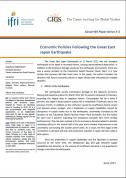Rare Earths and the East China Sea: Why hasn't China embargoed shipments to Japan?

As tensions persist between China and Japan in the East China Sea, it is interesting to note that one of the most symbolic actions of the previous crisis has yet to make an appearance this time around.
The stoppage of rare earth shipments to Japan in the fall of 2010 lasted nearly two months, threatened the health of vital Japanese industries, and placed this once obscure raw materials issue on the front page of newspapers across the globe. China’s near monopoly on the global production of rare earth oxides - metals that have become essential components in making a range of high tech products that include vehicles, wind turbines, consumer electronics, medical equipment and defense systems - proved to be a useful tool for applying pressure on Japan. Two years later, the possibility of China cutting off Japan’s access to rare earths has been floated once again in the Chinese press, but has yet to take place. So why hasn’t China played the rare earth card?
The opacity of China’s decision-making apparatus and of the rare earth business itself makes precise answers hard to come by, but a number of related points are worth noting and ultimately serve to contextualize China’s real power to use rare earths as an economic weapon today. In particular, the risks for China seem to be higher today than in 2010 while the potential impact on Japan is much lower.

Available in:
Regions and themes
Share
Download the full analysis
This page contains only a summary of our work. If you would like to have access to all the information from our research on the subject, you can download the full version in PDF format.
Rare Earths and the East China Sea: Why hasn't China embargoed shipments to Japan?
Related centers and programs
Discover our other research centers and programsFind out more
Discover all our analyses
RAMSES 2024. A World to Be Remade
For its 42nd edition, RAMSES 2024 identifies three major challenges for 2024.

France and the Philippines should anchor their maritime partnership
With shared interests in promoting international law and sustainable development, France and the Philippines should strengthen their maritime cooperation in the Indo-Pacific. Through bilateral agreements, expanded joint exercises and the exchange of best practices, both nations can enhance maritime domain awareness, counter security threats and develop blue economy initiatives. This deeper collaboration would reinforce stability and environmental stewardship across the region.

The China-led AIIB, a geopolitical tool?
The establishment of the Asian Infrastructure Investment Bank (AIIB) in 2016, on a Chinese initiative, constituted an attempt to bridge the gap in infrastructure financing in Asia. However, it was also perceived in the West as a potential vehicle for China’s geostrategic agendas, fueling the suspicion that the institution might compete rather than align with existing multilateral development banks (MDBs) and impose its own standards.
Jammu and Kashmir in the Aftermath of August 2019
The abrogation of Article 370, which granted special status to the state of Jammu and Kashmir (J&K), has been on the agenda of the Bharatiya Janata Party (BJP) for many decades.









